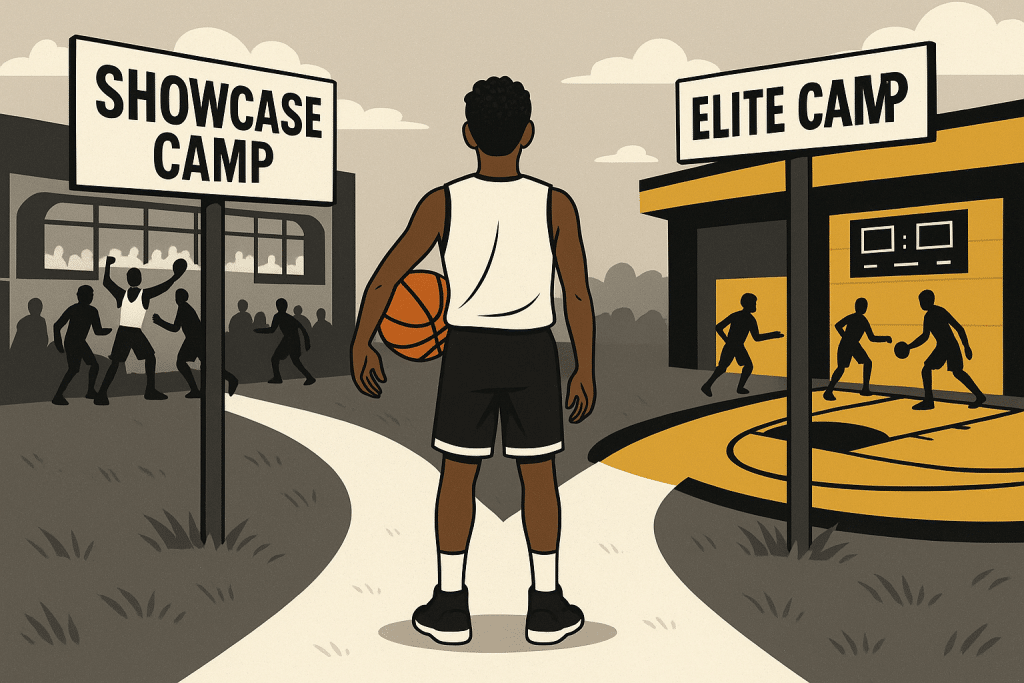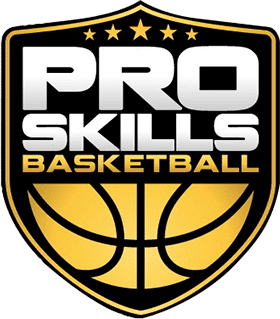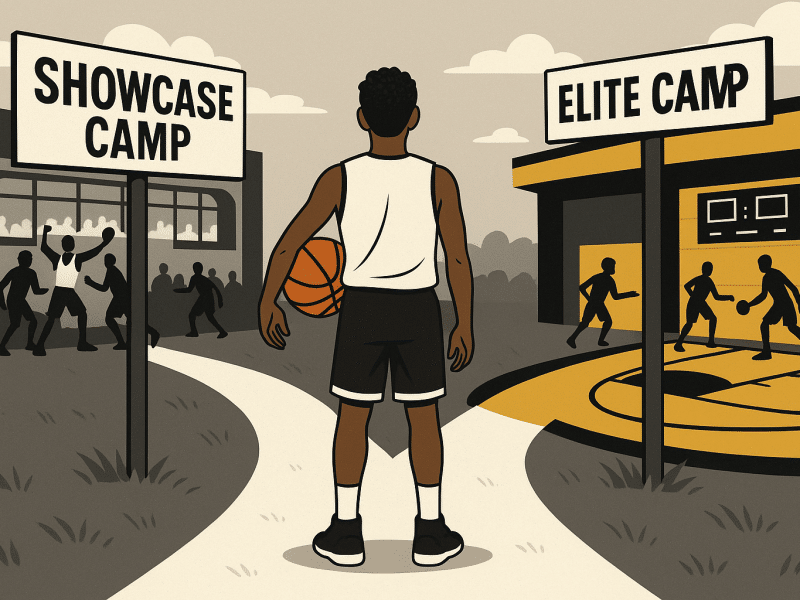
The Truth About Showcase “Exposure” & Elite College Basketball Camps
As summer approaches, so does one of the most important times in the basketball recruiting calendar: NCAA live, contact, and evaluation periods. But outside of these official windows, players and parents are often bombarded with invitations to various basketball camps promising “exposure” or “elite-level” experiences.
Let’s be clear: not all basketball camps are created equal.
There’s a major difference between showcase exposure camps and elite college basketball camps. In this post, we’ll break down the truth behind each, what players and parents need to know, and how to use these camps strategically to support a college basketball recruiting journey.
What’s the Difference Between Showcase and Elite Basketball Camps?

Showcase (Exposure) Camps
These events are typically run by third-party companies or scouting services. Their goal is to attract as many talented players as possible, let them scrimmage, and then promote rankings, “exposure,” and potential college looks—sometimes for a hefty fee.
Elite College Basketball Camps
These are run by actual college basketball programs. Their purpose is to bring in current recruits and high-potential prospects for closer evaluation and hands-on coaching. They’re often held on college campuses and provide a more structured, skill-focused experience.
Both types of camps can serve a purpose. But each comes with its own pros and cons, and players should be clear about what they’re signing up for.
Showcase/Exposure Basketball Camps: Helpful or Hype?
Let’s be honest—many showcase camps aren’t what they promise to be.
Common Pitfalls of Showcase Camps:
-
No real coaching or development. Most “exposure camps” just divide players into teams and let them play pickup games. There’s usually no teaching, no drills, and no individual feedback.
-
Lack of real exposure to college coaches. NCAA Division 1 and 2 coaches can only evaluate during official live periods. If a showcase is outside of those dates, most D1/D2 coaches can’t be there—even if the flyer says otherwise.
-
The illusion of success. Top-rated D1 prospects often get free entry to these camps. When they eventually sign scholarships, the camp takes credit for their success—even though those players would have been recruited with or without attending.
-
Scouting services can be unreliable. Many of these camps are operated by scouting services that blast coaches with emails about hundreds of players. Most of those messages go straight to spam or are ignored. College coaches build relationships and watch players over time—they don’t hand out scholarships based on a PDF ranking list.
“You don’t want to spend your summer getting exposed when you could have been improving.”
— Drew Hanlen, NBA Skills Trainer
When Can Showcase Camps Be Valuable?
-
To measure your game against other serious players. If a showcase draws a strong talent pool, it’s a great way to see where you stand, learn your strengths, and identify what you need to improve.
-
If it’s a reputable organization. Camps like Phenom Hoop Report, Hoop Group Academic Elite, and Jay Bilas Skills Camp have earned trust through consistent quality. Always research before signing up.
🟡 Pro Tip: Ask if the camp includes teaching stations, college coach attendance, and whether video will be available afterward. Be wary of flashy websites and vague promises.
Elite College Basketball Camps: Direct Access to Decision Makers
If you’re going to spend money on a camp, elite college basketball camps offer a lot more value.
These are hosted by actual college programs and often feature:
Key Benefits of Elite Camps:
-
You’re playing directly in front of scholarship decision-makers. These coaches can actually offer you a spot on their team—and being evaluated by them is much more valuable than playing in front of a scout.
-
Skill development is included. Most elite camps incorporate college-level practices, drills, film sessions, and feedback. Players walk away better—not just tired.
-
D3 coach presence. While D1 coaches are the primary hosts, many D3 programs attend these events to scout talent. That means more opportunities for players at different levels.
Considerations Before You Register:
-
Each camp is limited to one college program. Unless it’s a joint event (rare), you’ll only be seen by that one school’s staff.
-
Roster spots are scarce. Even if you perform well, the school might only have 1–2 open scholarships for your class—and hundreds of kids vying for those slots.
Still, elite camps are a powerful way to get a real feel for a college’s culture, coaches, and playing style—plus a potential first impression that sticks.
So, Should You Attend a Camp?
The Real Answer: It Depends on Your Goals
| Goal | Recommended Camp Type |
|---|---|
| Play in front of college coaches at a specific school | Elite College Camp |
| Compete against strong players & evaluate your level | Showcase Camp (reputable only) |
| Get coaching and skill development | Elite Camp (or a training-focused event) |
| Gain exposure to D1 coaches | Only during NCAA live periods |
🟡 IMPORTANT: Camps alone won’t earn you a scholarship. They should be just one part of a complete strategy, including:
-
Playing for a strong AAU team
-
Building your highlight reel
-
Reaching out directly to college coaches
-
Staying on top of your academics
Conclusion: Use Basketball Camps Wisely
Exposure camps and elite college basketball camps are tools—not magic tickets. When used thoughtfully and paired with a solid AAU season, personal development, and academic excellence, they can help open doors and provide important learning experiences.
✔️ Do your research
✔️ Know your goals
✔️ Use each opportunity to improve and grow
Ready to take the next step in your child’s basketball journey?
Pro Skills Basketball offers Club Teams, Camps, Clinics, and Academies in 25+ cities across the U.S.
👉 Find your city and sign up today to join a program focused on real development, experienced coaches, and a culture that puts players first.
📩 Contact us at admin@proskillsbasketball.com
📞 Call us at 866-996-3888



